The past weekend may’ve been the hottest of the year so far (at least here in the UK), but you and I know the truth: winter is here. With any dreams of spring still a few weeks away, let’s revel in the final moments we’ll be spending with our favourite inhabitants of Westeros — the first two episodes certainly did.
Also this month: Sky Atlantic’s Thrones companion shows, the third and final season of Deadwood, and more of the best of The Twilight Zone.

Game of Thrones Season 8 Episodes 1-2
 The final season of HBO’s fantasy epic began with its last two regular-length episodes (the remainder are each a feature-length 80 minutes, give or take), but they stand alongside the epics still to come as a kind of two-parter. Both episodes are set in the quiet before the storm(s) to come, with pieces being moved into place and everyone preparing themselves for what they assume is the endgame: a battle with the army of the dead. Of course, as outside observers we know the battle can’t be the end — there are whole characters and plot threads that will be left unresolved, whatever the outcome of the battle, and up to three (extra long) episodes to resolve them in. But such considerations are for future episodes; I mean, for one thing, next week’s big battle episode is likely to have a huge impact on who’s left standing, which will in itself indicate what ways forward remain possible.
The final season of HBO’s fantasy epic began with its last two regular-length episodes (the remainder are each a feature-length 80 minutes, give or take), but they stand alongside the epics still to come as a kind of two-parter. Both episodes are set in the quiet before the storm(s) to come, with pieces being moved into place and everyone preparing themselves for what they assume is the endgame: a battle with the army of the dead. Of course, as outside observers we know the battle can’t be the end — there are whole characters and plot threads that will be left unresolved, whatever the outcome of the battle, and up to three (extra long) episodes to resolve them in. But such considerations are for future episodes; I mean, for one thing, next week’s big battle episode is likely to have a huge impact on who’s left standing, which will in itself indicate what ways forward remain possible.
Anyway, back to the episodes we’ve already seen. The first, Winterfell, does the usual Game of Thrones season premiere thing of setting the scene: reminding us where everyone stands, and moving pieces into place ready for the season to come. But this is more than just a glorified “previously on”, with some important plot developments of its own, not to mention long-awaited reunions. In the former camp, the big’un is obviously Jon Snow finding out his true parentage. Well, to an extent: this isn’t news to the audience (even if you didn’t deduce it years ago, we were explicitly told about it last season… which aired, er, years ago), and while it clearly has an impact on Jon’s feelings about himself and his family, its effects on the plot won’t happen until more people hear about it.
More exciting were the reunions. Jon and Arya may’ve been the objective headliner, but my personal favourite was Sansa and Tyrion. With everything else that’s gone down since, I’d practically forgotten that they were once married, but the facts of their relationship and what’s happened to them since, particularly Sansa, made for an electric scene. Indeed, Sansa interacting with anyone is pretty fantastic at this point. She was such a damp squib in early seasons, and, frankly, I wasn’t convinced by Sophie Turner’s acting chops back then either, but recently she’s become a decided force to be reckoned with. Her scenes facing down with Dany are a case in point, not least their heart-to-heart in episode two. Another reunion highlight was Arya and the Hound, another unlikely but memorable pairing who get the short but sweet scene they deserve. Arya reunited with Gendry too, of course, and in the second episode she really united with him. Well, I’ll leave the furore around that to Twitter (but if you want to know what I think, this thread is pretty on the money).
 I’ve already slipped into discussing A Knight of the Seven Kingdoms, perhaps supporting my point that this is a two-parter in separate episodes’ clothing. Here we get more reunions, rehashes, and revelations. I mean, sure, Jaime arrives in Winterfell at the end of the previous episode, but it’s here that the meaning of that really plays out, with his trial-like scene before people he has wronged — and one he saved — before his one-on-one with the boy he pushed out of a tower all those years ago. In fact, if there’s one thing that does keep these two episodes distinct, it’s how much the season premiere mirrors the series premiere (i.e. season one episode one, Winter is Coming) — check out the image in this tweet for some of them.
I’ve already slipped into discussing A Knight of the Seven Kingdoms, perhaps supporting my point that this is a two-parter in separate episodes’ clothing. Here we get more reunions, rehashes, and revelations. I mean, sure, Jaime arrives in Winterfell at the end of the previous episode, but it’s here that the meaning of that really plays out, with his trial-like scene before people he has wronged — and one he saved — before his one-on-one with the boy he pushed out of a tower all those years ago. In fact, if there’s one thing that does keep these two episodes distinct, it’s how much the season premiere mirrors the series premiere (i.e. season one episode one, Winter is Coming) — check out the image in this tweet for some of them.
What the second episode really represented was some kind of… not reward, exactly, but certainly benefit, or acknowledgement, for those who’ve become invested in these characters over the many years we’ve spent with them (or, if you’ve only caught up recently, many bingeing hours). It was a chance to just hang out with some favourites, and for some of them to achieve long-awaited dreams. Yes, obviously I’m talking about Jaime knighting Brienne. I guess if you’re not invested in these characters then some of these scenes feel like so much padding (“get on with the fighting!”), but for most fans this is a possibly final chance to revel in their favourites — after all, surely a significant number are for the chop when the fighting begins…

Thronecast Specials + Series 8 Episodes 1-2
 If you live outside the UK or watch Thrones via, er, other means, I guess you won’t know this: it’s UK broadcaster Sky Atlantic’s Game of Thrones aftershow — you know, one of those things where people connected to the show and sundry minor celebrities sit on a sofa and chat about the episode we’ve just seen. I’ve never watched it before because I’m normally one of those people who watches Thrones via, er, other means, and it rarely crops up on those, but I’ve had access for the first couple of episodes and, well, so far I’m not impressed. In the first episode, host Sue Perkins gamely struggled with guests seemingly dead set on chatting about anything other than what her questions asked, while the second felt like she was trying to get blood from three particularly reticent stones. The format’s not really at fault, but the guest booker might be… The Twitter reaction to these episodes suggests the show used to be better, so maybe they’ll re-find their mojo for the coming four episodes.
If you live outside the UK or watch Thrones via, er, other means, I guess you won’t know this: it’s UK broadcaster Sky Atlantic’s Game of Thrones aftershow — you know, one of those things where people connected to the show and sundry minor celebrities sit on a sofa and chat about the episode we’ve just seen. I’ve never watched it before because I’m normally one of those people who watches Thrones via, er, other means, and it rarely crops up on those, but I’ve had access for the first couple of episodes and, well, so far I’m not impressed. In the first episode, host Sue Perkins gamely struggled with guests seemingly dead set on chatting about anything other than what her questions asked, while the second felt like she was trying to get blood from three particularly reticent stones. The format’s not really at fault, but the guest booker might be… The Twitter reaction to these episodes suggests the show used to be better, so maybe they’ll re-find their mojo for the coming four episodes.
More successful by far were two Thronecast-related specials that aired before season eight began (and these you can track down via the aforementioned euphemistic “other means”, if you’re interested). The first, Gameshow of Thrones, saw Perkins quizzing two teams made up of former cast members and celebrity fans in a panel show format. If you’re in the middle of a Venn diagram that covers “fans of Game of Thrones” and “enjoys comedy panel shows”, it’s a convivial 90 minutes. The other, The Story So Far, managed to recap the essential points of the parent show’s first seven seasons in another 90 minutes, with a mix of clips, narration, and cast and fan interviews — all very useful when we’re heading into the concluding hours of the story, especially when it’s been a couple of years since it was last on. Certainly quicker than a 67-hour full re-watch, anyway.

Deadwood Season 3
 It’s quite a well-known piece of trivia that creator David Milch’s original pitch to HBO was for a series about two lawmen in the early days of Rome, thematically concerned with how we establish the rules and agreements of a society. With the series Rome already in development, HBO encouraged Milch to take the interesting theme but relocate it, and so he landed upon a frontier town in the old West butting up against the ever-widening reach of civilisation. Nowhere is this more apparent than in the show’s third season, with local elections looming and outside forces attempting to exert their influence over the town. The latter is represented by the arrival of mining magnate George Hearst (Gerald McRaney), who becomes a thorn in the side of both previously-dominant saloon owner-cum-gangster Al Swearengen (Ian McShane) and honourable but short-tempered sheriff Seth Bullock (Timothy Olyphant). Those two, once enemies, must join forces (along with most of the other regular characters) to attempt to counter Hearst’s moves. Where once Al could’ve just had the guy killed and fed to Wu’s pigs, his outside connections make that impossible — stakeholders would come looking, bringing even more attention and seeking justice. Civilisation, eh?
It’s quite a well-known piece of trivia that creator David Milch’s original pitch to HBO was for a series about two lawmen in the early days of Rome, thematically concerned with how we establish the rules and agreements of a society. With the series Rome already in development, HBO encouraged Milch to take the interesting theme but relocate it, and so he landed upon a frontier town in the old West butting up against the ever-widening reach of civilisation. Nowhere is this more apparent than in the show’s third season, with local elections looming and outside forces attempting to exert their influence over the town. The latter is represented by the arrival of mining magnate George Hearst (Gerald McRaney), who becomes a thorn in the side of both previously-dominant saloon owner-cum-gangster Al Swearengen (Ian McShane) and honourable but short-tempered sheriff Seth Bullock (Timothy Olyphant). Those two, once enemies, must join forces (along with most of the other regular characters) to attempt to counter Hearst’s moves. Where once Al could’ve just had the guy killed and fed to Wu’s pigs, his outside connections make that impossible — stakeholders would come looking, bringing even more attention and seeking justice. Civilisation, eh?
In my review last month, I mentioned the season two storyline that saw Al taken out by illness, as a way to reduce his influence over the rest of the characters and events. Season three does something similar, but ‘depowers’ him in a more interesting way: against Hearst, Al is at a disadvantage, certainly in terms of brawn and, possibly, in terms of scheming brainpower too. The way one particular show of strength from the businessman emasculates Al leads to some great introspection, leading the barman to doubt himself and his skills, possibly for the first time ever, certainly that we’ve seen. It serves to further deepen and strengthen the quality of an already great character. At the start of season one he’s clearly a villain, but he quickly becomes more, so that by this point he’s really an anti-hero. That’s partly because he’s the lesser of two evils next to Hearst’s ruthlessness, but also because we’ve had time to get the true measure of his character — as much as he tries to hide it, Al has a bit of a heart, and he certainly operates according to codes of honour and loyalty. It might not always be the same as that of the rest of society, but it’s strongly held. He still does despicable stuff, but there are many shades of grey there; and while Al is the marquee example, you find those shades in all the other major characters too — it’s part of why every performance is so great, because this quality cast are given such excellent material to work with. When most of the characters who’ve been regulars since the start begin to come together in the face of the threat from Hearst, it’s immensely satisfying, even as the threat they face seems insurmountable. The final few episodes are exciting, powerful stuff.
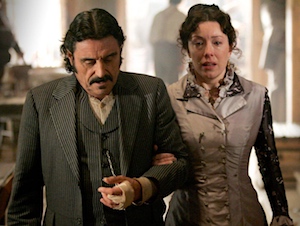 Not that the third season passes without fault, mind. By the middle of the season, episodes were being written so on the fly that they could only use standing sets and regular locations, because there wasn’t enough lead time to build anything new or travel to other locations. Later, outdoor scenes had to be cut back, as a tightening budget left no room for all the extras and horses needed to convey the town’s bustling streets. While these production issues are mostly covered for well enough, some storylines are also affected. For example, Wyatt Earp and his brother arrive in town, apparently with some big secret scheme in the offing, but in the very next episode that’s completely forgotten as they’re hastily written back out. Plus, considering the already sizeable regular and recurring cast, it’s mad that Milch decided to (a) add even more characters, and (b) devote an unwarranted amount of time to meandering subplots starring minor characters. It doesn’t ruin the show, but it means some good actors and characters go to waste as we while away time on things no one would miss if they‘d been ditched. The worst offender for me is Steve the Drunk and the never-ending kerfuffle around the livery, which starts out as an adequate and pointed subplot but eventually just drags on and on. Someone in the writers’ room must’ve loved that character and his (increasingly tiresome) verbal diarrhoea.
Not that the third season passes without fault, mind. By the middle of the season, episodes were being written so on the fly that they could only use standing sets and regular locations, because there wasn’t enough lead time to build anything new or travel to other locations. Later, outdoor scenes had to be cut back, as a tightening budget left no room for all the extras and horses needed to convey the town’s bustling streets. While these production issues are mostly covered for well enough, some storylines are also affected. For example, Wyatt Earp and his brother arrive in town, apparently with some big secret scheme in the offing, but in the very next episode that’s completely forgotten as they’re hastily written back out. Plus, considering the already sizeable regular and recurring cast, it’s mad that Milch decided to (a) add even more characters, and (b) devote an unwarranted amount of time to meandering subplots starring minor characters. It doesn’t ruin the show, but it means some good actors and characters go to waste as we while away time on things no one would miss if they‘d been ditched. The worst offender for me is Steve the Drunk and the never-ending kerfuffle around the livery, which starts out as an adequate and pointed subplot but eventually just drags on and on. Someone in the writers’ room must’ve loved that character and his (increasingly tiresome) verbal diarrhoea.
Similarly, many fans object to the acting troupe who turn up to establish a theatre in the town, their antics again seeming like an aside from the main thrust of the series. I have more sympathy for them, however. For starters, they’re led by the reliably excellent Brian Cox. His presence and interactions with the regulars is definitely worthwhile, especially in his position as an old friend of Swearengen’s, becoming a different kind of sounding board for Al, particularly valuable when he’s on the back foot for so much of the season. Secondly, I think it can be easy to forget that season three wasn’t meant to be the end — the theatre troupe may feel like time-wasters when we’ve got such limited time in this world, but the show was meant to carry on for several seasons after this, and their deeper merit was yet to come (plus there would’ve been plenty more time for everyone else, as well). Thirdly, Deadwood is the story of the titular town, and so the actors’ presence and effect on the town as a whole is the very point — Deadwood itself is the true main character, and its development is the primary “character arc” of the show.
 Sadly, that arc was never completed. Milch knew the writing was on the wall before the season was completed, and there’s a very plausible theory that the second half of the season is actually an allegory for the conflict between Milch and the executives at HBO (you can read about that in W. Earl Brown’s comment on this article at Uproxx), and it seems he used the little notice he had to attempt some kind of conclusion. It’s an odd old ending, though. You can see Milch knew it was going to be a de facto finale — it kinda serves as such — but, at the same time, it’s clearly not the final end he would’ve had if he could’ve. According to Milch, the final line of dialogue (which also gives the episode its title) was aimed at the audience. “Wants me to tell him something pretty” — meaning: the show’s refusal to wrap things up in a bow was not a failure to conclude; rather, it’s not a neat and tidy resolution because Milch was not just “telling us something pretty”.
Sadly, that arc was never completed. Milch knew the writing was on the wall before the season was completed, and there’s a very plausible theory that the second half of the season is actually an allegory for the conflict between Milch and the executives at HBO (you can read about that in W. Earl Brown’s comment on this article at Uproxx), and it seems he used the little notice he had to attempt some kind of conclusion. It’s an odd old ending, though. You can see Milch knew it was going to be a de facto finale — it kinda serves as such — but, at the same time, it’s clearly not the final end he would’ve had if he could’ve. According to Milch, the final line of dialogue (which also gives the episode its title) was aimed at the audience. “Wants me to tell him something pretty” — meaning: the show’s refusal to wrap things up in a bow was not a failure to conclude; rather, it’s not a neat and tidy resolution because Milch was not just “telling us something pretty”.
The disappointment of the series being cut down before its time is compounded by the fact this early cancellation seems to have stalled the show’s reputation in the minds of some. As a commenter observed on Uproxx review’s of the finale, it’s like people go, “ah, Deadwood — shame it got cancelled after only three seasons”, and leave it at that, while shows that come to a ‘proper’ ending (like The Sopranos or The Wire or Breaking Bad or whatever) get all the focus. Maybe it’s something sharpened by the very act of ending: people sit up and notice The End of an acclaimed show, even those who’ve never even watched it, but when a show just peters off or fades away because it was cancelled prematurely, it doesn’t get that moment of focusing. Maybe Deadwood will finally earn that recognition next month, when HBO airs the long-anticipated follow-up movie. It’s a great series — imperfect, I’d argue, but at its best the equal of any other — and it’s not mentioned as often as it should be.

The Twilight Zone ‘Best Of’
 The new Jordan Peele-hosted iteration of Twilight Zone still doesn’t have a UK broadcaster, so I’m continuing last month’s theme of cherrypicking the very best episodes from the original 1959-64 series.
The new Jordan Peele-hosted iteration of Twilight Zone still doesn’t have a UK broadcaster, so I’m continuing last month’s theme of cherrypicking the very best episodes from the original 1959-64 series.
One observation I made last time was that the series seems to be a victim of its own success, in that its influence has been so widespread over the past six decades that the original episodes sometimes seem already familiar or simplistic. Season one’s Walking Distance is another where this rears its head, because it takes the lead character half the episode to begin to realise something that’s obvious to a modern viewer much sooner. It’s the unavoidable side effect of being more widely exposed to these kind of stories; of being a more experienced and savvy viewer than people would’ve had the chance to be in 1959. So, any merits have to be found beyond the basic concept and/or twist to make it worthwhile viewing today, and in this case it’s a simple but effective overall message: you can’t go home again, even though you’ll wish to, but that’s ok. It’s a theme I have great fondness for (it’s intensely melancholic, a feeling I always value), so the episode still has its rewards.
Also from season one is Time Enough at Last, one of the series’ best-known episodes, but famous entirely for its ironic ending — something else that makes you worry it’ll be a pointless viewing exercise now, as you just wait for that final moment to come along. In fact, there’s slightly more to the episode than just a note of cosmic irony. And if you’re fortunate enough not to know the twist, even better — just watch it unencumbered and enjoy it all the more. One with a twist I didn’t know was season two’s Will the Real Martian Please Stand Up? It has a little bit of the paranoia of The Monsters Are Due on Maple Street, but plays more like a murder mystery, with a group of suspects gathered in a remote location. It doesn’t seem to quite know where to go with its own story after the setup, so kind of abandons it (the police just let everyone go!), but then it does have a couple of fun twists in the tail.
 Finally for now, two episodes that were remade in the 1983 film. Season three’s It’s a Good Life suggests that the worst monster imaginable is a six-year-old boy with unlimited power. Yeah, I buy that. This inspired my least-favourite segment of the film, but the original is so much better — more genuinely terrifying, whereas Joe Dante’s remake was just freakish and bizarre. Lastly, perhaps the series’ most famous episode of all (even though it didn’t come until the final season): Nightmare at 20,000 Feet. This is the one with William Shatner as a nervous airplane passenger who thinks he sees a gremlin on the wing. It’s written by Richard Matheson and directed by Richard Donner — you don’t get much higher calibre than that. It really is a perfect half-hour of TV, precisely paced and performed, keeping you riveted for every second, and unsure about whether Bob’s mind is fractured or the whole flight is in very real danger. The realisation of the gremlin is hokey, but other than that this is superb.
Finally for now, two episodes that were remade in the 1983 film. Season three’s It’s a Good Life suggests that the worst monster imaginable is a six-year-old boy with unlimited power. Yeah, I buy that. This inspired my least-favourite segment of the film, but the original is so much better — more genuinely terrifying, whereas Joe Dante’s remake was just freakish and bizarre. Lastly, perhaps the series’ most famous episode of all (even though it didn’t come until the final season): Nightmare at 20,000 Feet. This is the one with William Shatner as a nervous airplane passenger who thinks he sees a gremlin on the wing. It’s written by Richard Matheson and directed by Richard Donner — you don’t get much higher calibre than that. It really is a perfect half-hour of TV, precisely paced and performed, keeping you riveted for every second, and unsure about whether Bob’s mind is fractured or the whole flight is in very real danger. The realisation of the gremlin is hokey, but other than that this is superb.
To close, one general observation about all the episodes I’ve watched: Rod Serling is an absolutely fantastic host. When they’re on form (which they usually are), his opening and closing monologues are absolute magic. I don’t envy any other host the challenge of having to live up to him.

Things to Catch Up On
 This month, I have mostly been missing the new series of Line of Duty, BBC One’s ever-twisty police corruption drama. Given that it’s been trending on Twitter every week, it’s a wonder I’ve not had it spoiled… yet. It’s now two-thirds of the way through, so I’ll watch it intensively once it’s over. I’d promise a review next month, but last month I said that about Hanna and I’ve yet to make time for that. Maybe they’ll both be here next month. Also: Ghosts, the new comedy from the cast behind Horrible Histories and Yonderland, which looks promising but, again, is a couple of episodes in and I’ve yet to start.
This month, I have mostly been missing the new series of Line of Duty, BBC One’s ever-twisty police corruption drama. Given that it’s been trending on Twitter every week, it’s a wonder I’ve not had it spoiled… yet. It’s now two-thirds of the way through, so I’ll watch it intensively once it’s over. I’d promise a review next month, but last month I said that about Hanna and I’ve yet to make time for that. Maybe they’ll both be here next month. Also: Ghosts, the new comedy from the cast behind Horrible Histories and Yonderland, which looks promising but, again, is a couple of episodes in and I’ve yet to start.

Next month… the Battle of Winterfell.







 Favourite Film of the Month
Favourite Film of the Month

















 To call these two episodes “the climax” of Game of Thrones feels slightly disingenuous, because really the whole season has been the climax (to wit, my review of episodes one and two is
To call these two episodes “the climax” of Game of Thrones feels slightly disingenuous, because really the whole season has been the climax (to wit, my review of episodes one and two is  Conversely, I thought the finale, The Iron Throne, was excellently handled in virtually every respect, including the pace. Well, mostly. I mean, I think it’s only during their conversation in front of the Iron Throne that Jon realises what he has to do to Daenerys, so that he then immediately carries it out is a little abrupt — should he have gone away, to steel himself for the task, and done it later? Maybe. Equally, why wait? And the scene needs to occur there for the powerful events that follow with Drogon’s grief and melting the throne. Some would also say the time jump to the Dragonpit court is a case of rushing the story, but do we need to see the Unsullied taking Jon Snow prisoner? Do we need to see the armies arrive at the gates of King’s Landing? You could draw the story out by putting all of that on screen, but what you actually need to know for the narrative is conveyed in the dialogue. Mind you, here I am wondering if it should’ve been slower when some of those petition-signing halfwits reckon “nothing happened” this episode. After weeks moaning about the pace being too fast, they think this was so slow that “nothing happened”! There’s no helping some people…
Conversely, I thought the finale, The Iron Throne, was excellently handled in virtually every respect, including the pace. Well, mostly. I mean, I think it’s only during their conversation in front of the Iron Throne that Jon realises what he has to do to Daenerys, so that he then immediately carries it out is a little abrupt — should he have gone away, to steel himself for the task, and done it later? Maybe. Equally, why wait? And the scene needs to occur there for the powerful events that follow with Drogon’s grief and melting the throne. Some would also say the time jump to the Dragonpit court is a case of rushing the story, but do we need to see the Unsullied taking Jon Snow prisoner? Do we need to see the armies arrive at the gates of King’s Landing? You could draw the story out by putting all of that on screen, but what you actually need to know for the narrative is conveyed in the dialogue. Mind you, here I am wondering if it should’ve been slower when some of those petition-signing halfwits reckon “nothing happened” this episode. After weeks moaning about the pace being too fast, they think this was so slow that “nothing happened”! There’s no helping some people… To cap it all off, both episodes were incredibly well made. That’s par for the course on this mega-expensive show, but it still merits observing. Okay, perhaps The Bells had a few too many scenes of King’s Landing’s destruction (a point on pacing again), but it was all spectacularly realised, keeping us mostly in the streets with the people who were really suffering. For striking moments, however, the finale was the place to be: that shot of Dany with Drogon’s wings (the subject of its own mini Twitter controversy, for yet more dumbass reasons); her speech to her assembled forces in the ruins, the staging and design evoking the the Nazis or Stalin’s Russia; the melting throne; the final montage, with the matching shots of Sansa, Arya and Jon embracing their destinies; and the very final scene, a mirror image of the opening scene of the very first episode. What a way to end; even with a green root poking through the snow north of the Wall — a dream of spring.
To cap it all off, both episodes were incredibly well made. That’s par for the course on this mega-expensive show, but it still merits observing. Okay, perhaps The Bells had a few too many scenes of King’s Landing’s destruction (a point on pacing again), but it was all spectacularly realised, keeping us mostly in the streets with the people who were really suffering. For striking moments, however, the finale was the place to be: that shot of Dany with Drogon’s wings (the subject of its own mini Twitter controversy, for yet more dumbass reasons); her speech to her assembled forces in the ruins, the staging and design evoking the the Nazis or Stalin’s Russia; the melting throne; the final montage, with the matching shots of Sansa, Arya and Jon embracing their destinies; and the very final scene, a mirror image of the opening scene of the very first episode. What a way to end; even with a green root poking through the snow north of the Wall — a dream of spring. First, two episodes from season three. The Shelter is one of just four episodes in the entire series with no sci-fi or fantasy element (according to its IMDb trivia page). When the warning sirens go off that missiles, presumably nuclear, may be on their way to destroy the United States, a foresightful doctor and his family are able to retreat to their bomb shelter, but his less prepared neighbours want in too. It’s another of Rod Serling’s morality tales about the truth of human nature, and a particularly potent one because it’s very easy to relate to almost everyone’s position — there are no heroes or villains here (well, except for maybe one racist guy), just people who want to survive. The titular room is made for three people, not the dozen or so who try to break in to share it, which suggests perhaps the episode’s most universally applicable lesson: in panic, logic goes out the window.
First, two episodes from season three. The Shelter is one of just four episodes in the entire series with no sci-fi or fantasy element (according to its IMDb trivia page). When the warning sirens go off that missiles, presumably nuclear, may be on their way to destroy the United States, a foresightful doctor and his family are able to retreat to their bomb shelter, but his less prepared neighbours want in too. It’s another of Rod Serling’s morality tales about the truth of human nature, and a particularly potent one because it’s very easy to relate to almost everyone’s position — there are no heroes or villains here (well, except for maybe one racist guy), just people who want to survive. The titular room is made for three people, not the dozen or so who try to break in to share it, which suggests perhaps the episode’s most universally applicable lesson: in panic, logic goes out the window. For its fourth season, Twilight Zone was scheduled as a replacement for another series, meaning it had to expand to hour-long episodes to fill the given time slot. This is largely regarded as being to the series’ detriment, and I can see why — I mean, some of the 25-minute episodes feel padded, so doubling the length…! Consequently, season four has very few episodes at the top of either list. The exception is On Thursday We Leave for Home, which is the highest-ranked season four episode on both: it comes 10th at ScreenCrush, but still only 24th on IMDb. This one is outright sci-fi from the off: it’s set on mankind’s first off-world colony, which has been a disaster, and after three decades a spaceship is finally arriving to take them back to Earth. What unfolds is another tale of man’s hubris and delusion with a self-wrought tragic ending — in other words, an episode of The Twilight Zone. But it has a unique angle and commentary on the corrupting influence of power; about how being in charge of the colonists has become Captain Benteen’s very reason to exist, to the point where he not only can’t imagine life any other way, but he can’t imagine his ‘subjects’ would want it any other way either. He’s thoroughly deluded.
For its fourth season, Twilight Zone was scheduled as a replacement for another series, meaning it had to expand to hour-long episodes to fill the given time slot. This is largely regarded as being to the series’ detriment, and I can see why — I mean, some of the 25-minute episodes feel padded, so doubling the length…! Consequently, season four has very few episodes at the top of either list. The exception is On Thursday We Leave for Home, which is the highest-ranked season four episode on both: it comes 10th at ScreenCrush, but still only 24th on IMDb. This one is outright sci-fi from the off: it’s set on mankind’s first off-world colony, which has been a disaster, and after three decades a spaceship is finally arriving to take them back to Earth. What unfolds is another tale of man’s hubris and delusion with a self-wrought tragic ending — in other words, an episode of The Twilight Zone. But it has a unique angle and commentary on the corrupting influence of power; about how being in charge of the colonists has become Captain Benteen’s very reason to exist, to the point where he not only can’t imagine life any other way, but he can’t imagine his ‘subjects’ would want it any other way either. He’s thoroughly deluded. Finally for now, season one’s A Stop at Willoughby, which doesn’t quite make either list’s top ten (it’s 12th on IMDb, 17th on ScreenCrush), but I keep hearing it mentioned elsewhere as a favourite episode or referenced in other ways (as with Eye of the Beholder last time, it factors into Richard Linklater’s Everybody Wants Some!!). It’s about a harried ad exec in ’60s New York, whose boss’ motto of “push, push, push” pretty well tells how he’s feeling. On the train to his suburban home (there’s no real correlation here, but there are definite shades of Mad Men across this setup!) he falls asleep and wakes when the train stops at the village of Willoughby… in the year 1888. It’s an idyllic place on a warm summer day, with people enjoying leisurely strolls in the park — a simpler, calmer time. But then he really wakes up: he didn’t travel in time, Willoughby was just a dream; but it’s a dream of a place and time where he’d rather be — can he get back there? If
Finally for now, season one’s A Stop at Willoughby, which doesn’t quite make either list’s top ten (it’s 12th on IMDb, 17th on ScreenCrush), but I keep hearing it mentioned elsewhere as a favourite episode or referenced in other ways (as with Eye of the Beholder last time, it factors into Richard Linklater’s Everybody Wants Some!!). It’s about a harried ad exec in ’60s New York, whose boss’ motto of “push, push, push” pretty well tells how he’s feeling. On the train to his suburban home (there’s no real correlation here, but there are definite shades of Mad Men across this setup!) he falls asleep and wakes when the train stops at the village of Willoughby… in the year 1888. It’s an idyllic place on a warm summer day, with people enjoying leisurely strolls in the park — a simpler, calmer time. But then he really wakes up: he didn’t travel in time, Willoughby was just a dream; but it’s a dream of a place and time where he’d rather be — can he get back there? If  This fortnight I have mostly been missing Years and Years, the new drama from the pen of Russell T Davies that spans the next couple of decades to look at, presumably, how much worse things are going to get even than they are now. I’ve long been a big fan of Davies’ writing, though must confess I’ve missed most of what he’s done post-Doctor Who — I’ve been meaning to get round to A Very English Scandal ever since it aired, which was a whole year ago now. Hopefully I won’t take so long to get to this new one.
This fortnight I have mostly been missing Years and Years, the new drama from the pen of Russell T Davies that spans the next couple of decades to look at, presumably, how much worse things are going to get even than they are now. I’ve long been a big fan of Davies’ writing, though must confess I’ve missed most of what he’s done post-Doctor Who — I’ve been meaning to get round to A Very English Scandal ever since it aired, which was a whole year ago now. Hopefully I won’t take so long to get to this new one.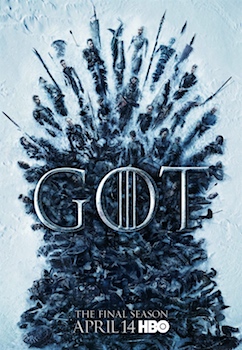 Almost two years ago, just hours after Game of Thrones’ seventh season finale aired,
Almost two years ago, just hours after Game of Thrones’ seventh season finale aired,  Content-wise, the episode was one long battle — the longest ever in film or TV history, apparently. More isn’t always more, mind. While I didn’t find it boring or drawn-out, it also wasn’t perfect. The battle tactics left a lot to be desired, something spotted by lay-viewers, never mind the “how it should’ve been done” articles by professional military tacticians that followed the broadcast. And the way things played out, a lot more deaths were warranted. Quite a few key characters did fall, and even more faceless masses, but the way it was staged made it a miracle that so many people escaped unscathed. There are three episodes left — you need characters to fuel the story, and major characters left to be sacrificed later too — but that doesn’t mean you have to stage it so everyone effects an improbable escape. There’s a balance to be found between “it looks like they’re all about to die” and “it seems literally impossible everyone would’ve survived those last-minute odds”. But hey, this isn’t the first time the show has succumbed to this, and there was a lot else to like: lots of effective individual sequences within the battle, great callbacks to previous lines and events, some heroic sacrifices, and a perfect ending. (I’m really not going to talk about some dickheads’ reaction to that.)
Content-wise, the episode was one long battle — the longest ever in film or TV history, apparently. More isn’t always more, mind. While I didn’t find it boring or drawn-out, it also wasn’t perfect. The battle tactics left a lot to be desired, something spotted by lay-viewers, never mind the “how it should’ve been done” articles by professional military tacticians that followed the broadcast. And the way things played out, a lot more deaths were warranted. Quite a few key characters did fall, and even more faceless masses, but the way it was staged made it a miracle that so many people escaped unscathed. There are three episodes left — you need characters to fuel the story, and major characters left to be sacrificed later too — but that doesn’t mean you have to stage it so everyone effects an improbable escape. There’s a balance to be found between “it looks like they’re all about to die” and “it seems literally impossible everyone would’ve survived those last-minute odds”. But hey, this isn’t the first time the show has succumbed to this, and there was a lot else to like: lots of effective individual sequences within the battle, great callbacks to previous lines and events, some heroic sacrifices, and a perfect ending. (I’m really not going to talk about some dickheads’ reaction to that.) It’s frustrating because I liked the tone of the episode overall — as I said, the return to human conflict and schemes; also a lot of the individual scenes between characters and so on. But it needs more room to breathe. It’s especially galling after the exceptionally spacious
It’s frustrating because I liked the tone of the episode overall — as I said, the return to human conflict and schemes; also a lot of the individual scenes between characters and so on. But it needs more room to breathe. It’s especially galling after the exceptionally spacious  This new sitcom from the writing and performing troupe behind the original TV iteration of Horrible Histories and the Sky One fantasy comedy Yonderland is pitched as a more adult-focused series, but it’s not exactly 18-rated stuff, just a little cheekier than they might’ve done before. Anyway, it’s about a young couple who inherit a crumbling old mansion, which is home to the ghosts of various people who’ve died there down the centuries. As the couple attempt to make a life for themselves and restore the place on a budget of nothing, the ghosts cause various issues, while also having problems of their own — turns out being dead isn’t the end of your emotional woes. I wouldn’t say Ghosts is the most hilarious sitcom you’ve ever seen, but it has a definite charm. It also surprises with genuine emotion, particularly in the third episode, where we learn about the death and family of one of the more recent ghosts.
This new sitcom from the writing and performing troupe behind the original TV iteration of Horrible Histories and the Sky One fantasy comedy Yonderland is pitched as a more adult-focused series, but it’s not exactly 18-rated stuff, just a little cheekier than they might’ve done before. Anyway, it’s about a young couple who inherit a crumbling old mansion, which is home to the ghosts of various people who’ve died there down the centuries. As the couple attempt to make a life for themselves and restore the place on a budget of nothing, the ghosts cause various issues, while also having problems of their own — turns out being dead isn’t the end of your emotional woes. I wouldn’t say Ghosts is the most hilarious sitcom you’ve ever seen, but it has a definite charm. It also surprises with genuine emotion, particularly in the third episode, where we learn about the death and family of one of the more recent ghosts. I’ve never seen Columbo before, and despite this being the first episode (er, kind of — I believe it was preceded by two other pilots) this isn’t the start of me watching it regularly. No, I watched this for one simple reason: the director was a certain Mr Steven Spielberg, in his pre-movie days when he directed a handful of TV episodes. Unsurprisingly, such an early work contains little about its style that screams “Spielberg”, but it’s still a classily staged production, with a lot more going for its visuals than the point-and-shoot style we associate with old TV. The story’s not a bad one either, about a crime novelist who murders his co-writer following the methodology from an unused plot. He thinks he’s a clever bugger who’s got away with it easily, but Columbo seems to see through him right from the start. Well, I’m not sure dumping the corpse on your own front lawn is the best way to go about claiming “it wasn’t me.”
I’ve never seen Columbo before, and despite this being the first episode (er, kind of — I believe it was preceded by two other pilots) this isn’t the start of me watching it regularly. No, I watched this for one simple reason: the director was a certain Mr Steven Spielberg, in his pre-movie days when he directed a handful of TV episodes. Unsurprisingly, such an early work contains little about its style that screams “Spielberg”, but it’s still a classily staged production, with a lot more going for its visuals than the point-and-shoot style we associate with old TV. The story’s not a bad one either, about a crime novelist who murders his co-writer following the methodology from an unused plot. He thinks he’s a clever bugger who’s got away with it easily, but Columbo seems to see through him right from the start. Well, I’m not sure dumping the corpse on your own front lawn is the best way to go about claiming “it wasn’t me.”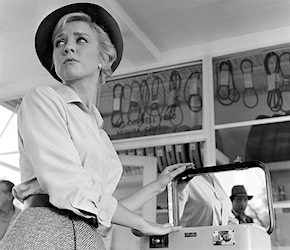 First up, season one’s The Hitch-Hiker is another Twilight Zone tale where we can’t be sure if the protagonist is experiencing paranoia or the supernatural — undoubtedly a recurring theme for the series, almost to the point where it’s less a “theme” more just a fact of its format. Anyway, this particular reiteration is effectively unnerving, with a scenario that’s relatable — you can just imagine how it would feel if you kept seeing the same hitchhiker by the side of the road, always somehow ahead of you, always staring at you with a despondent look… it gives me chills just thinking about it. Director Alvin Ganzer gets good mileage out of that element too, creating some effective shocks. Aside from that the execution isn’t top notch though, with Rod Serling seeming to have taken too much inspiration from the original radio play (by Lucille Fletcher) in his inclusion of some over-explanatory narration. The trademark twist ending is both altogether guessable for the savvy viewer, but also doesn’t really explain a whole lot.
First up, season one’s The Hitch-Hiker is another Twilight Zone tale where we can’t be sure if the protagonist is experiencing paranoia or the supernatural — undoubtedly a recurring theme for the series, almost to the point where it’s less a “theme” more just a fact of its format. Anyway, this particular reiteration is effectively unnerving, with a scenario that’s relatable — you can just imagine how it would feel if you kept seeing the same hitchhiker by the side of the road, always somehow ahead of you, always staring at you with a despondent look… it gives me chills just thinking about it. Director Alvin Ganzer gets good mileage out of that element too, creating some effective shocks. Aside from that the execution isn’t top notch though, with Rod Serling seeming to have taken too much inspiration from the original radio play (by Lucille Fletcher) in his inclusion of some over-explanatory narration. The trademark twist ending is both altogether guessable for the savvy viewer, but also doesn’t really explain a whole lot.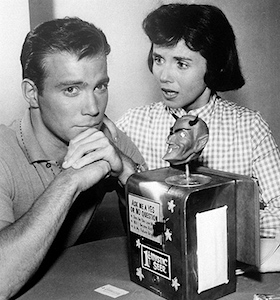 I was more taken with Nick of Time, written by the reliably superb Richard Matheson. Starring William Shatner as a superstitious honeymooner, it’s a neat little tale about a cheap fortune telling machine that might actually predict the future. As well as a genre tale about the perils such a machine might pose, it’s really about superstition and belief in fate vs. self determination — a strong moral life lesson bundled in a quirky supernatural fable. That’s Twilight Zone at its best, really. Similarly, season five’s Living Doll is another of the series’ most genuinely unnerving episodes. Telly Savalas stars as a man whose own insecurities make him paranoid and abusive towards his wife and stepdaughter. When the kid gets a new talking doll, it begins to taunt and threaten him, but only when no one else is around to hear. Again, it’s very creepy, but has a point to make beyond that.
I was more taken with Nick of Time, written by the reliably superb Richard Matheson. Starring William Shatner as a superstitious honeymooner, it’s a neat little tale about a cheap fortune telling machine that might actually predict the future. As well as a genre tale about the perils such a machine might pose, it’s really about superstition and belief in fate vs. self determination — a strong moral life lesson bundled in a quirky supernatural fable. That’s Twilight Zone at its best, really. Similarly, season five’s Living Doll is another of the series’ most genuinely unnerving episodes. Telly Savalas stars as a man whose own insecurities make him paranoid and abusive towards his wife and stepdaughter. When the kid gets a new talking doll, it begins to taunt and threaten him, but only when no one else is around to hear. Again, it’s very creepy, but has a point to make beyond that.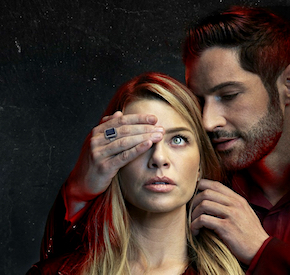 This fortnight, I have mostly been missing the fourth season of Lucifer, which just returned as a Netflix exclusive. I’ve not watched season three yet, though, so that’ll be a little while off. I’ve also successfully managed to avoid any spoilers about Line of Duty’s recently-concluded series (touch wood). I’ve got a plan to binge it in a few weeks’ time (so, not in my next TV roundup, but should be the one after) — hopefully nothing will blow its secrets between now and then!
This fortnight, I have mostly been missing the fourth season of Lucifer, which just returned as a Netflix exclusive. I’ve not watched season three yet, though, so that’ll be a little while off. I’ve also successfully managed to avoid any spoilers about Line of Duty’s recently-concluded series (touch wood). I’ve got a plan to binge it in a few weeks’ time (so, not in my next TV roundup, but should be the one after) — hopefully nothing will blow its secrets between now and then!
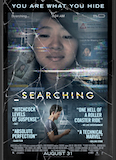












 The final season of HBO’s fantasy epic began with its last two regular-length episodes (the remainder are each a feature-length 80 minutes, give or take), but they stand alongside the epics still to come as a kind of two-parter. Both episodes are set in the quiet before the storm(s) to come, with pieces being moved into place and everyone preparing themselves for what they assume is the endgame: a battle with the army of the dead. Of course, as outside observers we know the battle can’t be the end — there are whole characters and plot threads that will be left unresolved, whatever the outcome of the battle, and up to three (extra long) episodes to resolve them in. But such considerations are for future episodes; I mean, for one thing, next week’s big battle episode is likely to have a huge impact on who’s left standing, which will in itself indicate what ways forward remain possible.
The final season of HBO’s fantasy epic began with its last two regular-length episodes (the remainder are each a feature-length 80 minutes, give or take), but they stand alongside the epics still to come as a kind of two-parter. Both episodes are set in the quiet before the storm(s) to come, with pieces being moved into place and everyone preparing themselves for what they assume is the endgame: a battle with the army of the dead. Of course, as outside observers we know the battle can’t be the end — there are whole characters and plot threads that will be left unresolved, whatever the outcome of the battle, and up to three (extra long) episodes to resolve them in. But such considerations are for future episodes; I mean, for one thing, next week’s big battle episode is likely to have a huge impact on who’s left standing, which will in itself indicate what ways forward remain possible. I’ve already slipped into discussing A Knight of the Seven Kingdoms, perhaps supporting my point that this is a two-parter in separate episodes’ clothing. Here we get more reunions, rehashes, and revelations. I mean, sure, Jaime arrives in Winterfell at the end of the previous episode, but it’s here that the meaning of that really plays out, with his trial-like scene before people he has wronged — and one he saved — before his one-on-one with the boy he pushed out of a tower all those years ago. In fact, if there’s one thing that does keep these two episodes distinct, it’s how much the season premiere mirrors the series premiere (i.e. season one episode one, Winter is Coming) — check out
I’ve already slipped into discussing A Knight of the Seven Kingdoms, perhaps supporting my point that this is a two-parter in separate episodes’ clothing. Here we get more reunions, rehashes, and revelations. I mean, sure, Jaime arrives in Winterfell at the end of the previous episode, but it’s here that the meaning of that really plays out, with his trial-like scene before people he has wronged — and one he saved — before his one-on-one with the boy he pushed out of a tower all those years ago. In fact, if there’s one thing that does keep these two episodes distinct, it’s how much the season premiere mirrors the series premiere (i.e. season one episode one, Winter is Coming) — check out  If you live outside the UK or watch Thrones via, er, other means, I guess you won’t know this: it’s UK broadcaster Sky Atlantic’s Game of Thrones aftershow — you know, one of those things where people connected to the show and sundry minor celebrities sit on a sofa and chat about the episode we’ve just seen. I’ve never watched it before because I’m normally one of those people who watches Thrones via, er, other means, and it rarely crops up on those, but I’ve had access for the first couple of episodes and, well, so far I’m not impressed. In the first episode, host Sue Perkins gamely struggled with guests seemingly dead set on chatting about anything other than what her questions asked, while the second felt like she was trying to get blood from three particularly reticent stones. The format’s not really at fault, but the guest booker might be… The Twitter reaction to these episodes suggests the show used to be better, so maybe they’ll re-find their mojo for the coming four episodes.
If you live outside the UK or watch Thrones via, er, other means, I guess you won’t know this: it’s UK broadcaster Sky Atlantic’s Game of Thrones aftershow — you know, one of those things where people connected to the show and sundry minor celebrities sit on a sofa and chat about the episode we’ve just seen. I’ve never watched it before because I’m normally one of those people who watches Thrones via, er, other means, and it rarely crops up on those, but I’ve had access for the first couple of episodes and, well, so far I’m not impressed. In the first episode, host Sue Perkins gamely struggled with guests seemingly dead set on chatting about anything other than what her questions asked, while the second felt like she was trying to get blood from three particularly reticent stones. The format’s not really at fault, but the guest booker might be… The Twitter reaction to these episodes suggests the show used to be better, so maybe they’ll re-find their mojo for the coming four episodes. It’s quite a well-known piece of trivia that creator David Milch’s original pitch to HBO was for a series about two lawmen in the early days of Rome, thematically concerned with how we establish the rules and agreements of a society. With the series Rome already in development, HBO encouraged Milch to take the interesting theme but relocate it, and so he landed upon a frontier town in the old West butting up against the ever-widening reach of civilisation. Nowhere is this more apparent than in the show’s third season, with local elections looming and outside forces attempting to exert their influence over the town. The latter is represented by the arrival of mining magnate George Hearst (Gerald McRaney), who becomes a thorn in the side of both previously-dominant saloon owner-cum-gangster Al Swearengen (Ian McShane) and honourable but short-tempered sheriff Seth Bullock (Timothy Olyphant). Those two, once enemies, must join forces (along with most of the other regular characters) to attempt to counter Hearst’s moves. Where once Al could’ve just had the guy killed and fed to Wu’s pigs, his outside connections make that impossible — stakeholders would come looking, bringing even more attention and seeking justice. Civilisation, eh?
It’s quite a well-known piece of trivia that creator David Milch’s original pitch to HBO was for a series about two lawmen in the early days of Rome, thematically concerned with how we establish the rules and agreements of a society. With the series Rome already in development, HBO encouraged Milch to take the interesting theme but relocate it, and so he landed upon a frontier town in the old West butting up against the ever-widening reach of civilisation. Nowhere is this more apparent than in the show’s third season, with local elections looming and outside forces attempting to exert their influence over the town. The latter is represented by the arrival of mining magnate George Hearst (Gerald McRaney), who becomes a thorn in the side of both previously-dominant saloon owner-cum-gangster Al Swearengen (Ian McShane) and honourable but short-tempered sheriff Seth Bullock (Timothy Olyphant). Those two, once enemies, must join forces (along with most of the other regular characters) to attempt to counter Hearst’s moves. Where once Al could’ve just had the guy killed and fed to Wu’s pigs, his outside connections make that impossible — stakeholders would come looking, bringing even more attention and seeking justice. Civilisation, eh? Not that the third season passes without fault, mind. By the middle of the season, episodes were being written so on the fly that they could only use standing sets and regular locations, because there wasn’t enough lead time to build anything new or travel to other locations. Later, outdoor scenes had to be cut back, as a tightening budget left no room for all the extras and horses needed to convey the town’s bustling streets. While these production issues are mostly covered for well enough, some storylines are also affected. For example, Wyatt Earp and his brother arrive in town, apparently with some big secret scheme in the offing, but in the very next episode that’s completely forgotten as they’re hastily written back out. Plus, considering the already sizeable regular and recurring cast, it’s mad that Milch decided to (a) add even more characters, and (b) devote an unwarranted amount of time to meandering subplots starring minor characters. It doesn’t ruin the show, but it means some good actors and characters go to waste as we while away time on things no one would miss if they‘d been ditched. The worst offender for me is Steve the Drunk and the never-ending kerfuffle around the livery, which starts out as an adequate and pointed subplot but eventually just drags on and on. Someone in the writers’ room must’ve loved that character and his (increasingly tiresome) verbal diarrhoea.
Not that the third season passes without fault, mind. By the middle of the season, episodes were being written so on the fly that they could only use standing sets and regular locations, because there wasn’t enough lead time to build anything new or travel to other locations. Later, outdoor scenes had to be cut back, as a tightening budget left no room for all the extras and horses needed to convey the town’s bustling streets. While these production issues are mostly covered for well enough, some storylines are also affected. For example, Wyatt Earp and his brother arrive in town, apparently with some big secret scheme in the offing, but in the very next episode that’s completely forgotten as they’re hastily written back out. Plus, considering the already sizeable regular and recurring cast, it’s mad that Milch decided to (a) add even more characters, and (b) devote an unwarranted amount of time to meandering subplots starring minor characters. It doesn’t ruin the show, but it means some good actors and characters go to waste as we while away time on things no one would miss if they‘d been ditched. The worst offender for me is Steve the Drunk and the never-ending kerfuffle around the livery, which starts out as an adequate and pointed subplot but eventually just drags on and on. Someone in the writers’ room must’ve loved that character and his (increasingly tiresome) verbal diarrhoea. Sadly, that arc was never completed. Milch knew the writing was on the wall before the season was completed, and there’s a very plausible theory that the second half of the season is actually an allegory for the conflict between Milch and the executives at HBO (you can read about that in W. Earl Brown’s comment on
Sadly, that arc was never completed. Milch knew the writing was on the wall before the season was completed, and there’s a very plausible theory that the second half of the season is actually an allegory for the conflict between Milch and the executives at HBO (you can read about that in W. Earl Brown’s comment on  The new Jordan Peele-hosted iteration of Twilight Zone still doesn’t have a UK broadcaster, so I’m continuing
The new Jordan Peele-hosted iteration of Twilight Zone still doesn’t have a UK broadcaster, so I’m continuing  Finally for now, two episodes that were remade in
Finally for now, two episodes that were remade in  This month, I have mostly been missing the new series of Line of Duty, BBC One’s ever-twisty police corruption drama. Given that it’s been trending on Twitter every week, it’s a wonder I’ve not had it spoiled… yet. It’s now two-thirds of the way through, so I’ll watch it intensively once it’s over. I’d promise a review next month, but last month I said that about Hanna and I’ve yet to make time for that. Maybe they’ll both be here next month. Also: Ghosts, the new comedy from the cast behind Horrible Histories and Yonderland, which looks promising but, again, is a couple of episodes in and I’ve yet to start.
This month, I have mostly been missing the new series of Line of Duty, BBC One’s ever-twisty police corruption drama. Given that it’s been trending on Twitter every week, it’s a wonder I’ve not had it spoiled… yet. It’s now two-thirds of the way through, so I’ll watch it intensively once it’s over. I’d promise a review next month, but last month I said that about Hanna and I’ve yet to make time for that. Maybe they’ll both be here next month. Also: Ghosts, the new comedy from the cast behind Horrible Histories and Yonderland, which looks promising but, again, is a couple of episodes in and I’ve yet to start.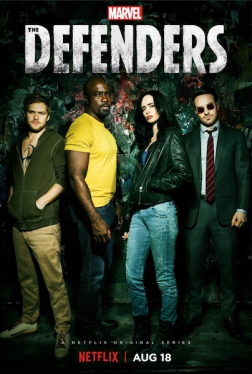 After years of build-up, and a grand total of 65 episodes of lead-in shows (yes, that many, really), we’re finally here: the culmination of Phase One in the Netflix arm of the Marvel Cinematic Universe. Like Phase One of the movie side, said culmination is a big ol’ team-up of every hero we’ve been introduced to so far, working together to stop a threat that’s been building across some of their individual series.
After years of build-up, and a grand total of 65 episodes of lead-in shows (yes, that many, really), we’re finally here: the culmination of Phase One in the Netflix arm of the Marvel Cinematic Universe. Like Phase One of the movie side, said culmination is a big ol’ team-up of every hero we’ve been introduced to so far, working together to stop a threat that’s been building across some of their individual series.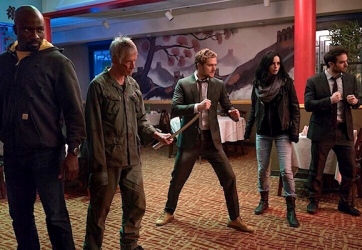 With the team introduced to one another, Royal Dragon is almost a bottle episode — the gang hole up in a Chinese restaurant to hide from the Hand and make a plan. It works neatly to let our heroes settle their differences and agree to actually team up. There’s some fun sparky dialogue in their interactions, too. For my money it’s the best instalment of the series. The downside: having said that episode three is the end of act one, episode four really feels that way, with the team finally united — but we’re halfway through the series.
With the team introduced to one another, Royal Dragon is almost a bottle episode — the gang hole up in a Chinese restaurant to hide from the Hand and make a plan. It works neatly to let our heroes settle their differences and agree to actually team up. There’s some fun sparky dialogue in their interactions, too. For my money it’s the best instalment of the series. The downside: having said that episode three is the end of act one, episode four really feels that way, with the team finally united — but we’re halfway through the series.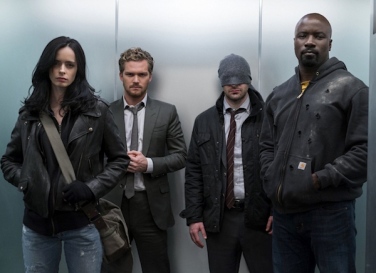 Overall, the relative brevity and speed of the story here does make it feel like an event miniseries, more than the sprawling and novelistic styles of the four contributing series. Maybe it’s just because it’s how I chose to watch it, but I reckon it plays better as four feature-length episodes than eight normal-length ones. As this is Netflix and you can watch at your own pace, maybe that doesn’t matter; but if you were watching this weekly, I think it’d be immensely frustrating that it took three whole weeks to get to the actual team-up. In a
Overall, the relative brevity and speed of the story here does make it feel like an event miniseries, more than the sprawling and novelistic styles of the four contributing series. Maybe it’s just because it’s how I chose to watch it, but I reckon it plays better as four feature-length episodes than eight normal-length ones. As this is Netflix and you can watch at your own pace, maybe that doesn’t matter; but if you were watching this weekly, I think it’d be immensely frustrating that it took three whole weeks to get to the actual team-up. In a 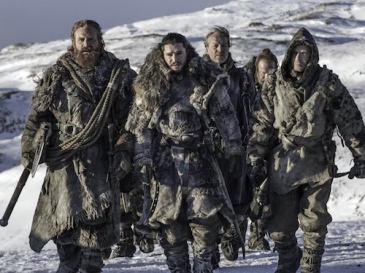 Picking up where
Picking up where 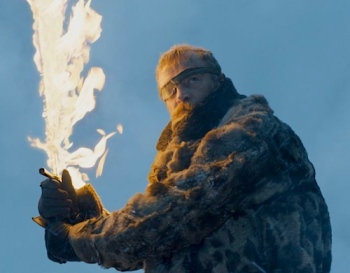 So ignoring those somewhat facile complaints, we can get back to looking at the end of the episode as pure spectacle. Other people (people not complaining about the timelines) hailed this as the series’ most incredible visual display yet. Well, some people always do that. It was great to see the dragons in action against the army of the dead, the exploding ice indeed looked spectacular, but as a battle it wasn’t equal to what we saw in Hardhome, Battle of the Bastards, or this season’s The Spoils of War. Coming fourth(-ish) to those is still a mean feat.
So ignoring those somewhat facile complaints, we can get back to looking at the end of the episode as pure spectacle. Other people (people not complaining about the timelines) hailed this as the series’ most incredible visual display yet. Well, some people always do that. It was great to see the dragons in action against the army of the dead, the exploding ice indeed looked spectacular, but as a battle it wasn’t equal to what we saw in Hardhome, Battle of the Bastards, or this season’s The Spoils of War. Coming fourth(-ish) to those is still a mean feat.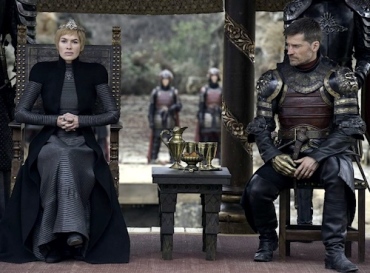 Some people were blown away by the twists and revelations in the finale. I guess it’s the fault of the internet age, but it felt like an awful lot of stuff that had just been a long time coming to me. The Night King using his dragon to melt the wall should probably have been mind-blowing, but it felt like it was just a matter of time (him actually getting a dragon the week before, however, was as effective as it was meant to be). The reveal about Jon Snow? We’ve already had enough breadcrumbs to put it together. It’s not really worth mentioning until Jon hears it for himself. On the other hand, the revelation that Bran doesn’t know everything — he has the option to see anything ever, but he has to go looking for specifics — is potentially important. How? Well, we’ll see.
Some people were blown away by the twists and revelations in the finale. I guess it’s the fault of the internet age, but it felt like an awful lot of stuff that had just been a long time coming to me. The Night King using his dragon to melt the wall should probably have been mind-blowing, but it felt like it was just a matter of time (him actually getting a dragon the week before, however, was as effective as it was meant to be). The reveal about Jon Snow? We’ve already had enough breadcrumbs to put it together. It’s not really worth mentioning until Jon hears it for himself. On the other hand, the revelation that Bran doesn’t know everything — he has the option to see anything ever, but he has to go looking for specifics — is potentially important. How? Well, we’ll see.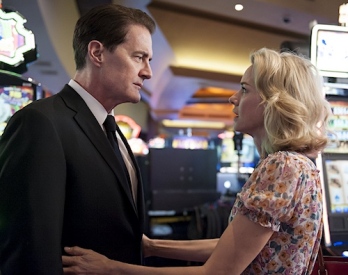 As we reach the penultimate week of the Twin Peaks revival, the one-armed man speaks for us all: “You are awake… Finally.”
As we reach the penultimate week of the Twin Peaks revival, the one-armed man speaks for us all: “You are awake… Finally.”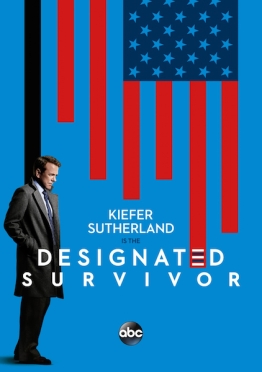 While signed up to Netflix for The Defenders, I also started watching this Netflix “Original” (it’s on ABC in the US, but Netflix have global rights, hence it gets their “we made this, honest” branding over here). Its setup has intrigued me since it launched last year, but its traditional release model (21 episodes across nine months) didn’t fit with my “subscribe for a month now and then” usage of Netflix until after the season had finished, i.e. now.
While signed up to Netflix for The Defenders, I also started watching this Netflix “Original” (it’s on ABC in the US, but Netflix have global rights, hence it gets their “we made this, honest” branding over here). Its setup has intrigued me since it launched last year, but its traditional release model (21 episodes across nine months) didn’t fit with my “subscribe for a month now and then” usage of Netflix until after the season had finished, i.e. now.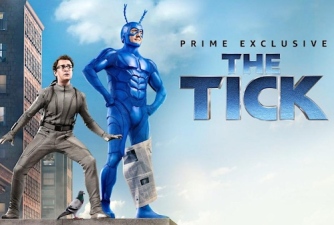 This month, I have mostly been missing Amazon’s new version of The Tick, the first half of the first season of which debuted last week, a full year after the pilot was made available. I wasn’t too impressed by that episode (my review is
This month, I have mostly been missing Amazon’s new version of The Tick, the first half of the first season of which debuted last week, a full year after the pilot was made available. I wasn’t too impressed by that episode (my review is  The first of this month’s quartet of trips to Westeros, Stormborn, demonstrated better than
The first of this month’s quartet of trips to Westeros, Stormborn, demonstrated better than  The most epic so far came in The Spoils of War. Apparently it’s been dubbed the Field of Fire — if there’s one thing Game of Thrones is consistently good at, it’s giving its big events cool monikers. (The “Field of Fire” is also an event from the series’ backstory, I believe, so maybe some of the reviews I read just got confused.) But it’s not just cool shots of fiery destruction that make this episode so satisfying: it’s the way that changes the game. Not to mention characters coming together after so long apart, both on the battlefield and not. That two girls talking in a crypt can be as thrilling as a dragon blowing shit up is… well, how character investment works, I guess. Some reckon this is the series’ best-ever episode. I wouldn’t go that far, but it is right near the top.
The most epic so far came in The Spoils of War. Apparently it’s been dubbed the Field of Fire — if there’s one thing Game of Thrones is consistently good at, it’s giving its big events cool monikers. (The “Field of Fire” is also an event from the series’ backstory, I believe, so maybe some of the reviews I read just got confused.) But it’s not just cool shots of fiery destruction that make this episode so satisfying: it’s the way that changes the game. Not to mention characters coming together after so long apart, both on the battlefield and not. That two girls talking in a crypt can be as thrilling as a dragon blowing shit up is… well, how character investment works, I guess. Some reckon this is the series’ best-ever episode. I wouldn’t go that far, but it is right near the top. Elisabeth Moss, star of both Mad Men, a series partly about the sexual politics of the ’60s workplace, and The Handmaid’s Tale, a series about the sexual politics of a world where women are baby-making slaves, returns as Det. Robin Griffin for a second run of Top of the Lake, which is now a series about the sexual politics of present-day Australia.
Elisabeth Moss, star of both Mad Men, a series partly about the sexual politics of the ’60s workplace, and The Handmaid’s Tale, a series about the sexual politics of a world where women are baby-making slaves, returns as Det. Robin Griffin for a second run of Top of the Lake, which is now a series about the sexual politics of present-day Australia. There are some great performances in there too, mainly from the female characters — no surprise, really, considering creator and co-writer/co-director Jane Campion is clearly interested in exploring women’s place in the world. Moss carries things, with Robin competent but combative at work (she needs to be, as the Australian police force seems stuck in the ’70s with its gender politics) even as her personal life is a tumultuous mess. Nicole Kidman gets to play it kooky as the adoptive mother of Robin’s child, who’s gone all spiritual and lesbian recently. The most entertaining is Gwendoline Christie as an enthusiastic constable who latches on to Robin, eager to be her protégé. She brings the bulk of the humour, with great lines and moments aplenty, but also brings emotional depth when needed.
There are some great performances in there too, mainly from the female characters — no surprise, really, considering creator and co-writer/co-director Jane Campion is clearly interested in exploring women’s place in the world. Moss carries things, with Robin competent but combative at work (she needs to be, as the Australian police force seems stuck in the ’70s with its gender politics) even as her personal life is a tumultuous mess. Nicole Kidman gets to play it kooky as the adoptive mother of Robin’s child, who’s gone all spiritual and lesbian recently. The most entertaining is Gwendoline Christie as an enthusiastic constable who latches on to Robin, eager to be her protégé. She brings the bulk of the humour, with great lines and moments aplenty, but also brings emotional depth when needed. I must be honest with you, dear readers: the longer this Twin Peaks revival goes on, the less I feel I’m enjoying it. It works best when Lynch is trying to out-Lynch himself. Those episodes are crazy and borderline nonsensical and insanely challenging to what constitutes filmed entertainment, but at least they’re interesting; and if you don’t get it you can dismiss it as “it’s Lynch, innit”. It’s actually the ‘normal’ stuff — the investigations and machinations in South Dakota, Las Vegas, and Twin Peaks itself — that are beginning to get on my wick. Again, at times there are moments of clarity or inspired weirdness, but in between sits a morass of sludgy plotting and wilfully obscure characterisation. It’s starting to nudge the series from “revelatory experiment” into “noble failure” territory, for me.
I must be honest with you, dear readers: the longer this Twin Peaks revival goes on, the less I feel I’m enjoying it. It works best when Lynch is trying to out-Lynch himself. Those episodes are crazy and borderline nonsensical and insanely challenging to what constitutes filmed entertainment, but at least they’re interesting; and if you don’t get it you can dismiss it as “it’s Lynch, innit”. It’s actually the ‘normal’ stuff — the investigations and machinations in South Dakota, Las Vegas, and Twin Peaks itself — that are beginning to get on my wick. Again, at times there are moments of clarity or inspired weirdness, but in between sits a morass of sludgy plotting and wilfully obscure characterisation. It’s starting to nudge the series from “revelatory experiment” into “noble failure” territory, for me. As I noted
As I noted  The second series of BBC Two’s period crime drama jumps forward two years to find everyone’s favourite Brummie criminals running such a successful business that they intend to expand their operations to London, by sticking their oar into a turf war between the Jews (led by Tom Hardy) and the Italians (led by Noah Taylor). Meanwhile, Sam Neill’s copper is back with a vengeance, teaming up with the Irish to blackmail Blinders kingpin Cillian Murphy into performing an off-the-books assassination for the crown.
The second series of BBC Two’s period crime drama jumps forward two years to find everyone’s favourite Brummie criminals running such a successful business that they intend to expand their operations to London, by sticking their oar into a turf war between the Jews (led by Tom Hardy) and the Italians (led by Noah Taylor). Meanwhile, Sam Neill’s copper is back with a vengeance, teaming up with the Irish to blackmail Blinders kingpin Cillian Murphy into performing an off-the-books assassination for the crown. This month, I have mostly been missing Torchwood: Aliens Among Us. Although ‘just’ an audio drama from Big Finish, it’s being marketed as the series’ official fifth season, picking up after the events of 2011’s (disappointing) Miracle Day. A full 12-episode run, it’s coming out in three box sets — although part two isn’t out until October and part three until February, part one came out last week. Obviously, I’ve not listened to it yet. Hopefully next time…
This month, I have mostly been missing Torchwood: Aliens Among Us. Although ‘just’ an audio drama from Big Finish, it’s being marketed as the series’ official fifth season, picking up after the events of 2011’s (disappointing) Miracle Day. A full 12-episode run, it’s coming out in three box sets — although part two isn’t out until October and part three until February, part one came out last week. Obviously, I’ve not listened to it yet. Hopefully next time…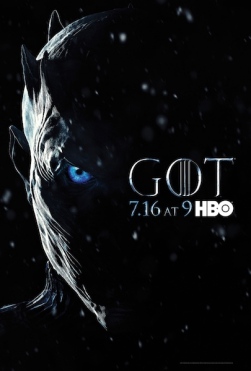 Season premieres of Thrones are typically concerned with re-establishing where all the major characters are, and maybe moving their stories on a few baby steps to indicate where they’ll be headed this season. Dragonstone is no exception. So where Arya had arrived in Westeros to kill the Starks’ enemies, now she’s slaughtering them by the hallful; where Bran and Meera were headed for the Wall, now they’re passing through it; where Jon and Sansa were taking charge in the North to be ready for war, now they’re preparing for war; where Sam had headed to the Citadel to research important stuff, now he’s in the Citadel researching important stuff; where Cersei had taken the Iron Throne and Jamie had his doubts, now Cersei’s preparing to defend her kingdoms and Jamie has his doubts; and where Dany was sailing for Westeros with her hodgepodge military, now she’s landed in Westeros. The wonder of Thrones is that it can take such scene-setting and turn it into riveting television.
Season premieres of Thrones are typically concerned with re-establishing where all the major characters are, and maybe moving their stories on a few baby steps to indicate where they’ll be headed this season. Dragonstone is no exception. So where Arya had arrived in Westeros to kill the Starks’ enemies, now she’s slaughtering them by the hallful; where Bran and Meera were headed for the Wall, now they’re passing through it; where Jon and Sansa were taking charge in the North to be ready for war, now they’re preparing for war; where Sam had headed to the Citadel to research important stuff, now he’s in the Citadel researching important stuff; where Cersei had taken the Iron Throne and Jamie had his doubts, now Cersei’s preparing to defend her kingdoms and Jamie has his doubts; and where Dany was sailing for Westeros with her hodgepodge military, now she’s landed in Westeros. The wonder of Thrones is that it can take such scene-setting and turn it into riveting television.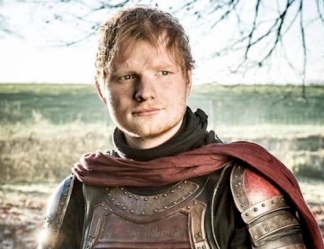 In fact, the only thing letting the side down was the well-publicised cameo by Ed Sheeran. If you have no idea who Mr Sheeran is then perhaps his appearance was fine — his acting was no worse than dozens of other bit players they’ve had on the series before now. But if you do know who the singer-songwriter is, his appearance was like being served a cheese board accompanied by cheese crackers with a glass of melted cheese and extra cheese on the side. After devoting what felt like a significant chunk of time (but was probably mere seconds) to him singing a song, Arya trots over to him and goes, “I don’t know that one,” and he says, “it’s a new one,” which he may as well have followed up with, “which you can hear in full on my new album, available now everywhere music is sold.” I have no idea if he has a new album out, or if that song would be on it if he did, but that’s how it felt.
In fact, the only thing letting the side down was the well-publicised cameo by Ed Sheeran. If you have no idea who Mr Sheeran is then perhaps his appearance was fine — his acting was no worse than dozens of other bit players they’ve had on the series before now. But if you do know who the singer-songwriter is, his appearance was like being served a cheese board accompanied by cheese crackers with a glass of melted cheese and extra cheese on the side. After devoting what felt like a significant chunk of time (but was probably mere seconds) to him singing a song, Arya trots over to him and goes, “I don’t know that one,” and he says, “it’s a new one,” which he may as well have followed up with, “which you can hear in full on my new album, available now everywhere music is sold.” I have no idea if he has a new album out, or if that song would be on it if he did, but that’s how it felt.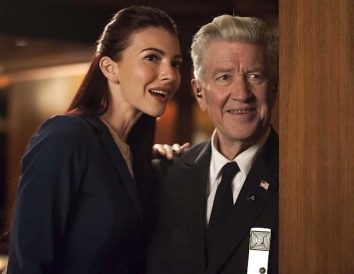 Slowly, very slowly, the disparate strands of Twin Peaks Mk.III seem to be coalescing into a coherent, connected story… which is almost more frustrating, in its own way. By that I mean: when it was wilfully obscure, you just kind of went with it — it was Lynch being Lynch, and you had to let it wash over you and allow your feelings to do the deduction about what it was supposed to signify. Now that the plot is beginning to crystallise into something your rational brain can make sense of, it feels a mite slow in getting there. I mean, while Dougie Jones is less annoying than he used to be (helped in no small part by the brilliance of Naomi Watts), I still miss real Coop, and we’re running out of episodes to spend time with him again. Was MacLachlan just feeding us a red herring when he said he’d “almost forgotten how to play him”? Because he hasn’t played him yet! Ach, we’ll see. It remains defiantly its own thing, and at least we can trust Lynch is going somewhere with it — even if we may never be able to work out precisely where that somewhere was…
Slowly, very slowly, the disparate strands of Twin Peaks Mk.III seem to be coalescing into a coherent, connected story… which is almost more frustrating, in its own way. By that I mean: when it was wilfully obscure, you just kind of went with it — it was Lynch being Lynch, and you had to let it wash over you and allow your feelings to do the deduction about what it was supposed to signify. Now that the plot is beginning to crystallise into something your rational brain can make sense of, it feels a mite slow in getting there. I mean, while Dougie Jones is less annoying than he used to be (helped in no small part by the brilliance of Naomi Watts), I still miss real Coop, and we’re running out of episodes to spend time with him again. Was MacLachlan just feeding us a red herring when he said he’d “almost forgotten how to play him”? Because he hasn’t played him yet! Ach, we’ll see. It remains defiantly its own thing, and at least we can trust Lynch is going somewhere with it — even if we may never be able to work out precisely where that somewhere was…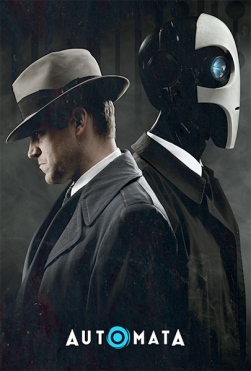 Based on a webcomic from the creators of Penny Arcade and funded through Kickstarter (so far it’s only available to backers), this miniseries-cum-pilot (the five short episodes total 58 minutes) takes place in an alternate Prohibition-era America, where “Prohibition” instead refers to the ban on production of automatons — sentient robots. Ex-copper Sam Regal (Basil Harris) and his partner Carl (voiced by Doug Jones), an automaton, now make ends meet as PIs, doing the usual PI thing: photographing cheating spouses. Only this time the run-of-the-mill case leads them into a murderous web that encompasses speakeasies, robo-gigolos*, underground automaton-hating gangs, and a twist ending (natch).
Based on a webcomic from the creators of Penny Arcade and funded through Kickstarter (so far it’s only available to backers), this miniseries-cum-pilot (the five short episodes total 58 minutes) takes place in an alternate Prohibition-era America, where “Prohibition” instead refers to the ban on production of automatons — sentient robots. Ex-copper Sam Regal (Basil Harris) and his partner Carl (voiced by Doug Jones), an automaton, now make ends meet as PIs, doing the usual PI thing: photographing cheating spouses. Only this time the run-of-the-mill case leads them into a murderous web that encompasses speakeasies, robo-gigolos*, underground automaton-hating gangs, and a twist ending (natch).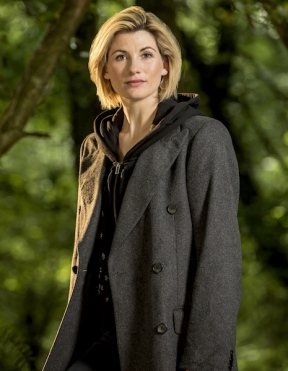 The biggest TV news this fortnight was undoubtedly the BBC’s announcement of the 13th actor to take the title role in Doctor Who. (Well, the 14th. Well, the… oh, let’s not get into that.) As you surely can’t have missed, it was Jodie Whittaker, who is a woman! Gasp! Naturally, there was some outrage. After all, it makes no sense whatsoever that an alien being who can travel in time and changes his whole body every time one gets worn out could possibly, during that change, switch from being a man to a woman, even if it’s been established multiple times within the series itself that such a change is possible. It’s just not plausible, is it?
The biggest TV news this fortnight was undoubtedly the BBC’s announcement of the 13th actor to take the title role in Doctor Who. (Well, the 14th. Well, the… oh, let’s not get into that.) As you surely can’t have missed, it was Jodie Whittaker, who is a woman! Gasp! Naturally, there was some outrage. After all, it makes no sense whatsoever that an alien being who can travel in time and changes his whole body every time one gets worn out could possibly, during that change, switch from being a man to a woman, even if it’s been established multiple times within the series itself that such a change is possible. It’s just not plausible, is it?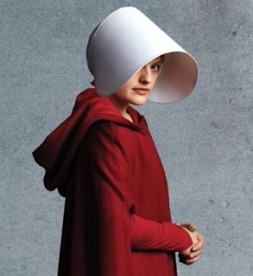 This month, I have mostly been missing The Handmaid’s Tale. It belatedly started airing on this side of the pond at the end of May, but it slipped my mind so much that I didn’t even mention it in
This month, I have mostly been missing The Handmaid’s Tale. It belatedly started airing on this side of the pond at the end of May, but it slipped my mind so much that I didn’t even mention it in 








